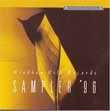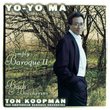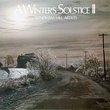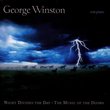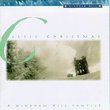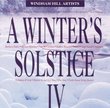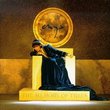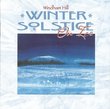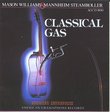| All Artists: Edgar Meyer, Mark O'Connor, Stephen [1] Foster, Traditional, James [Guitar/Vocals] Taylor, Anonymous, James Taylor, Alison Krauss Title: Appalachian Journey [SACD] Members Wishing: 2 Total Copies: 0 Label: Sony Release Date: 3/21/2000 Album Type: Enhanced, Super Audio CD - DSD Genres: Folk, Special Interest, Pop, Classical Styles: Traditional Folk, Vocal Pop, Chamber Music, Historical Periods, Classical (c.1770-1830) Number of Discs: 1 SwapaCD Credits: 1 Other Editions: Appalachian Journey UPC: 074646678268 |
Search - Edgar Meyer, Mark O'Connor, Stephen [1] Foster :: Appalachian Journey [SACD]
![Appalachian Journey [SACD]](https://nationalbookswap.com/cd//l/10/7810/6087810.jpg) | Edgar Meyer, Mark O'Connor, Stephen [1] Foster Appalachian Journey [SACD] Genres: Folk, Special Interest, Pop, Classical
With the help of some friends (James Taylor and Alison Krauss lend some vocal support), the trio of Yo-Yo Ma, Edgar Meyer, and Mark O'Connor have created yet another fascinating hybrid of chamber music and bluegrass. This ... more » |
Larger Image |
CD DetailsSynopsis
Amazon.com With the help of some friends (James Taylor and Alison Krauss lend some vocal support), the trio of Yo-Yo Ma, Edgar Meyer, and Mark O'Connor have created yet another fascinating hybrid of chamber music and bluegrass. This follow-up to 1996's Appalachia Waltz is filled with highly lyrical string passages, a homage or two to Copland, and plenty of tracks where Meyer's bass vamps with the best of them. This is reflective (and relaxing) music, lacking the intricate structure of classical music and the rough edges of folk. But, boy, is it catchy! Yo-Yo Ma fans may be disappointed to hear that--aside from the gorgeous "Duet for Cello and Bass"--the cellist takes more of a supportive role on this disc. Still, this is fun music, more intimate than Short Trip Home (Meyer's other crossover project for Sony), but still lively (just check out "1B" or "Caprice for Three"). --Jason Verlinde Similarly Requested CDs
|
CD ReviewsThe Second Time's A Charm! Bob Zeidler | Charlton, MA United States | 05/27/2000 (5 out of 5 stars) "Seldom does a sequel live up to the advance billing suggested by its predecessor. All too often, sequels (most particularly in publishing and in the cinema) represent little more than a form of pernicious milking of "what worked the first time around." On the other hand, sequels occasionally do exceed the expectations set out by their forbears. Such is the case with Appalachian Journey, where Messsrs. Ma, Meyer and O'Connor do manage to top themselves, in significant ways, regarding what they did in the earlier Appalachia Waltz. The reason is not particularly hard to find: familiarity breeds ease and comfort. At risk of implying that "practice makes perfect," it is nonetheless a fact that Meyer and O'Connor, in this sequel, have found better ways to incorporate Ma's remarkable talents - non-improvisational though they may be - into the fabric of the music. The outcome to my ears is measureably better than in Appalachia Waltz. These guys are in a groove now, and there are are fewer "set pieces" written primarily to explore how these three stringed instruments might coalesce into a new style of string trio writing (and less recycling of material heard elsewhere, and earlier, such as interpolations from O'Connor's Fiddle Concerto), and more exploration into the true strengths of Meyer's and O'Connor's compositional skills, which are considerable indeed. Over time (and, I might add, a rather short period at that), it has become simple for me to identify, by style, which are from the pen of Meyer and which from O'Connor. Put simply, Meyer's have his by-now-well-known rhythmic challenges, and O'Connor's are altogether more lyrical. (The writer of the booklet notes would have us believe that Meyer's compositional style looks back at the folk and chamber music of Bartok and Kodaly; I hear instead Janacek.) The skill level is high indeed; Caprice for Three pretty well establishes that these three can play up a fury. And I think that the jazz-inflected playing of O'Connor on Cloverfoot Reel is a welcome peek into a style of O'Connor's playing that I for one would want to hear more of. Alison Krauss and James Taylor make meaningful contributions as well. (The choice of Foster songs is indeed interesting. Taylor, here, repeats a song - Hard Times Come No More - that Willie Nelson sang on Darol Anger's Heritage album of a few years back, an occurrence that I find to be more than just coincidence.) If I could find fault with this trio at all, it would be in the fact that Yo-Yo simply doesn't "smoke" the way that Edgar and Mark do. In this respect, a collaboration including Edgar and Mark and a cellist who can truly improvise could be revelatory. Three such cellists come to mind: David Darling, Eric Friedlander, and Eugene Friesen. Now, Eugene can really smoke! And that would make an interesting project for this particular fan of Friesen, Meyer and O'Connor! The booklet notes are helpful. Just concentrate, if you can, on the quotes by the three of them, and avoid the hyperbole in the booket writer's notes. It's a real stretch to call this the classical music of the future. It's subgenre entertainment. But great entertainment. Bob Zeidler" Not as strong as APPALACHIA WALTZ, but still beautiful Zenbob | Woodstock, NY USA | 08/22/2000 (4 out of 5 stars) "Mark O'Connor is one of the world's most brilliant improvising fiddlers and Edgar Meyer an exceptionally accomplished bassist and composer who moves seamlessly among the varied musical worlds of bluegrass, classical, folk and country. They team up again with Yo-Yo Ma, a classical cellist who has spent the last several years working to broaden his musical horizons (a duet album with Stephane Grapelli, an album of Piazolla's tango music, a collaboration with Bobby McFerrin). In their first teaming, APPALACHIAN WALTZ, the mixture of Ma's technique with Meyer and O'Connor's improvising and composing abilities produced fabulous results: almost a new genre of music, "classical folkgrass." In this endeavor, the three go to the well again but don't find quite the same high level of magic. It's hard to complain very strenuously -- these are, after all, three of the finest musicians that we have. As James Agee said of the Marx Brothers, "the worst they ever made is better than most things I can think of." The same is true here. But there is still a nagging disappointment in this outing. Some of the performances seem a little rushed, unpolished, some of the arrangements a little strained. While there are moments of beauty, excitement and truly thrilling collaborative playing (Meyer's 1B truly rocks!), this sounds almost like an off-the-cuff jam session than a thought-out collaboration." Mellow classical music with country influences Peter Durward Harris | Leicester England | 07/02/2003 (5 out of 5 stars) "Musically speaking, my tastes are wide-ranging and very eclectic but my first love is country and my second is pop. I enjoy listening to classical music occasionally but have never really got into it. However, I am always on the look out for something different and when I found this in my recommendations I was intrigued, because although classical music and country music both evolved from folk music, they did so at different times and in completely different ways. On the face of it, blending them together might seem impossible. This album, while essentially classical, has definite country influences. Some might say Celtic rather than country, but I think their previous album, Appalachia Waltz (which I also own) has a much stronger Celtic feel to it than this one.Mark O'Connor originally made his name as a Nashville session musician playing the fiddle but gave that up to pursue a career as a violinist. Of course, the fiddle and the violin are actually the same instrument but the style of playing is very different. Mark teamed up with Edgar Mayer (bass) and Yo-Yo Ma (cello) to record this album. The album is mainly instrumental, but there are two songs, one featuring James Taylor (Hard times come again no more, on which he also plays guitar) and the other featuring Alison Krauss (Slumber my darling). James also plays guitar on Benjamin. Alison plays violin on Fisher's hornpipe, but not on Slumber my darling. No other instruments are used anywhere on the album. Stephen Foster wrote the two songs. The other tunes were all either traditional or written by one of the performers.I'm not sure who this music is primarily aimed at - it may too country for classical fans and too classical for country fans - but if, like me, you are looking for something different, give this a listen."
|

 Track Listings (15) - Disc #1
Track Listings (15) - Disc #1